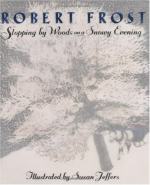|
This section contains 725 words (approx. 3 pages at 300 words per page) |

|
SOURCE: Gray, Richard J. “In Search of a Past: The Fugitive Movement and the Major Traditionalists.” In American Poetry of the Twentieth Century, pp. 101–52. New York: Longman, 1990.
In the following excerpted essay, Gray discusses the seeming lack of resolution in the closing lines of “Stopping by Woods on a Snowy Evening.”
The duality of the narrator's response to the woods [in “Stopping by Woods on a Snowy Evening”] is caught in the contrast between the relaxed, conversational idiom of the first three lines (note the gentle emphasis given to ‘think’, the briskly colloquial ‘though’) and the dreamlike descriptive detail and hypnotic verbal music (‘watch … woods’, ‘his … fill … with’) of the last. Clearing and wilderness, law and freedom, civilization and nature, fact and dream: these oppositions reverberate throughout American writing. And they are registered here in Frost's own quietly ironic contrast between the road along which the narrator travels...
|
This section contains 725 words (approx. 3 pages at 300 words per page) |

|


